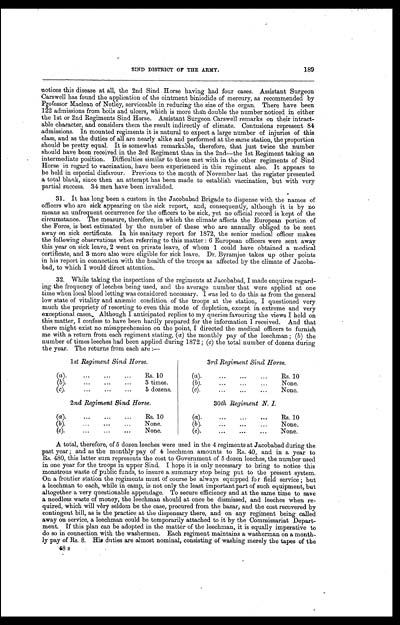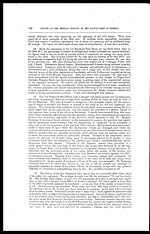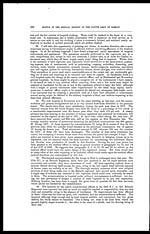Medicine - Institutions > Army health reports and medical documents > Sketch of the medical history of the native army of Bombay > Sketch of the medical history of the native army of Bombay, for the year 1872
(198) Page 189
Download files
Individual page:
Thumbnail gallery: Grid view | List view

SIND DISTRICT OF THE ARMY.
189
notices this disease at all, the 2nd Sind Horse having had four cases. Assistant Surgeon
Carswell has found the application of the ointment biniodide of mercury, as recommended by
Professor Maclean of Netley, serviceable in reducing the size of the organ. There have been
122 admissions from boils and ulcers, which is more than double the number noticed in either
the 1st or 2nd Regiments Sind Horse. Assistant Surgeon Carswell remarks on their intract-
able character, and considers them the result indirectly of climate. Contusions represent 84
admissions. In mounted regiments it is natural to expect a large number of injuries of this
class, and as the duties of all are nearly alike and performed at the same station, the proportion
should be pretty equal. It is somewhat remarkable, therefore, that just twice the number
should have been received in the 3rd Regiment than in the 2nd—the 1st Regiment taking an
intermediate position. Difficulties similar to those met with in the other regiments of Sind
Horse in regard to vaccination, have been experienced in this regiment also. It appears to
be held in especial disfavour. Previous to the month of November last the register presented
a total blank, since then an attempt has been made to establish vaccination, but with very
partial success. 34 men have been invalided.
31. It has long been a custom in the Jacobabad Brigade to dispense with the names of
officers who are sick appearing on the sick report, and, consequently, although it is by no
means an unfrequent occurrence for the officers to be sick, yet no official record is kept of the
circumstance. The measure, therefore, in which the climate affects the European portion of
the Force, is best estimated by the number of these who are annually obliged to be sent
away on sick certificate. In his sanitary report for 1872, the senior medical officer makes
the following observations when referring to this matter: 6 European officers were sent away
this year on sick leave, 2 went on private leave, of whom 1 could have obtained a medical
certificate, and 3 more also were eligible for sick leave. Dr. Byramjee takes up other points
in his report in connection with the health of the troops as affected by the climate of Jacoba-
bad, to which I would direct attention.
32. While taking the inspections of the regiments at Jacobabad, I made enquires regard-
ing the frequency of leeches being used, and the average number that were applied at one
time when local blood letting was considered necessary. I was led to do this as from the general
low state of vitality and anæmic condition of the troops at the station, I questioned very
much the propriety of resorting to even this mode of depletion, except in extreme and very
exceptional cases. Although I anticipated replies to my queries favouring the views I held on
this matter, I confess to have been hardly prepared for the information I received. And that
there might exist no misapprehension on the point, I directed the medical officers to furnish
me with a return from each regiment stating, (a ) the monthly pay of the leechman; (b) the
number of times leeches had been applied during 1872; (c) the total number of dozens during
the year. The returns from each are:—
| 1st Regiment Sind Horse. | ||||
| (a) | ... | ... | ... | Rs. 10 |
| (b) | ... | ... | ... | 3 times. |
| (c) | ... | ... | ... | 5 dozens. |
| 2nd Regiment Bind Horse. | ||||
| (a) | ... | ... | ... | Rs. 10 |
| (b) | ... | ... | ... | None. |
| (c) | ... | ... | ... | None. |
| 3rd Regiment Sind Horse. | ||||
| (a) | ... | ... | ... | Rs. 10 |
| (b) | ... | ... | ... | None. |
| (c) | ... | ... | ... | None. |
| 30th Regiment N. I. | ||||
| (a) | ... | ... | ... | Rs. 10 |
| (b) | ... | ... | ... | None. |
| (c) | ... | ... | ... | None. |
A total, therefore, of 5 dozen leeches were used in the 4 regiments at Jacobabad during the
past year; and as the monthly pay of 4 leechman amounts to Rs. 40, and in a year to
Rs. 480, this latter sum represents the cost to Government of 5 dozen leeches, the number used
in one year for the troops in upper Sind. I hope it is only necessary to bring to notice this
monstrous waste of public funds, to insure a summary stop being put to the present system.
On a frontier station the regiments must of course be always equipped for field service; but
a leechman to each, while in camp, is not only the least important part of such equipment, but
altogether a very questionable appendage. To secure efficiency and at the same time to save
a needless waste of money, the leechman should at once be dismissed, and leeches when re-
quired, which will very seldom be the case, procured from the bazar, and the cost recovered by
contingent bill, as is the practice at the dispensary there, and on any regiment being called
away on service, a leechman could be temporarily attached to it by the Commissariat Depart-
ment. If this plan can be adopted in the matter of the leechman, it is equally imperative to
do so in connection with the washermen. Each regiment maintains a washerman on a month-
ly pay of Rs. 8. His duties are almost nominal, consisting of washing merely the tapes of the
48 s
Set display mode to: Large image | Zoom image | Transcription
Images and transcriptions on this page, including medium image downloads, may be used under the Creative Commons Attribution 4.0 International Licence unless otherwise stated. ![]()
| Permanent URL | https://digital.nls.uk/75013232 |
|---|




